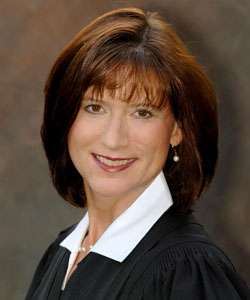Federal Judge on Trump's SCOTUS Short-List Issues Major 2nd Amendment Decision
Judge Diane Sykes strikes down Chicago gun range restrictions.

On Wednesday the U.S. Court of Appeals for the 7th Circuit handed Second Amendment advocates a major victory when it struck down multiple gun range regulations imposed by the city of Chicago as unconstitutional infringements on the right to keep and bear arms. The majority opinion in the case, Ezell v. Chicago, was written by Judge Diane Sykes, whose name appears on Donald Trump's short-list of possible Supreme Court nominees.
The underlying issue in Ezell v. Chicago is the Windy City's hostile reaction to the Supreme Court's 2010 ruling in McDonald v. Chicago, in which the Court struck down the city's handgun ban for violating the Second Amendment. In response to McDonald, Chicago enacted a new handgun permitting scheme which, among other things, required permit holders to complete one hour of training at a gun range. Yet Chicago also outlawed the existence of all gun ranges within city limits, thereby placing a rather significant obstacle in the path of any Chicago resident seeking to exercise his or her constitutional rights. In 2011 that city-wide gun range ban was struck down by the 7th Circuit. Judge Sykes also wrote that decision.
Yesterday's ruling follows on the heels of the 2011 case. After losing in federal court five years ago, Chicago adopted another new regulatory scheme for gun ranges. But once again the city tried to smother the Second Amendment with red tape. For example, it imposed new zoning regulations that would only allow gun ranges within manufacturing districts while also forbidding gun ranges from being built within 100 feet of each other and within 500 feet of residential districts, schools, or places of worship. In addition, the city forbid anyone under the age of 18 from lawfully entering a gun range.
Writing yesterday for the majority, Judge Sykes invalidated all three of those regulations. As she points out, under the new zoning laws,
only 2.2% of the city's total acreage is even theoretically available, and the commercial viability of any of these parcels is questionable—so much so that no shooting range yet exists. This severely limits Chicagoans' Second Amendment right to maintain proficiency in firearm use via target practice at a range. To justify these barriers, the City raised only speculative claims of harm to public health and safety. That's not nearly enough to survive the heightened scrutiny that applies to burdens on Second Amendment rights.
Furthermore, "the age restriction also flunks heightened scrutiny." That's because the Second Amendment, Judge Sykes writes,
protects the right to learn and practice firearm use in the controlled setting of a shooting range. The City insists that no person under age 18 enjoys this right. That's an extraordinarily broad claim, and the City failed to back it up. Nor did the City adequately justify barring anyone under 18 from entering a range. To the contrary, its own witness on this subject agreed that the age restriction is overbroad because teenagers can safely be taught to shoot and youth firearm instruction is both prudent and can be conducted in a safe manner.
In short, Chicago tried to bypass the Second Amendment and the 7th Circuit benchslapped the city down.
The decision in Ezell v. City of Chicago is available here.
Related: What Trump SCOTUS Short-Lister Diane Sykes Had to Say About John Roberts and Judicial Deference


Show Comments (280)